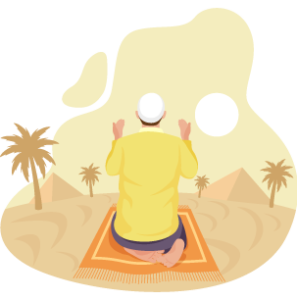Al Saddiq (R.A)
Pre-Islamic Period
Date of birth. The exact date of birth of Abu Bakr is not known. According to traditions he was younger than the Holy Prophet of Islam by two years and a few months. As the Holy Prophet was born in 571 CE, we can safely hold that Abu Bakr was born at Makkah some time in the year 573 C.E.
The family. Abu Bakr’s father was Othman surnamed Abu Qahafa, and his mother was Salma surnamed Umm-ul-Khair. They belonged to the Bani Taim branch of the Quraish.
The genealogy of Abu Bakr joined with that of the Holy Prophet, eight generations back in their common ancestor Murrah.
The Holy Prophet was the son of Abdullah, who was the son of Abdul Muttalib, who was the son of Hashim, who was the son of Abd Manaf, who was the son of Qussayi, who was the son of Kulab, who was the son of Murrah.
Abu Bakr was the son of Othman, who was the son of ‘Amar, who was the son of ‘Amr, who was the son of Ka’ab, who was the son of Sa’ad, who was the son of Taim, who was the son of Murrah.
Name. The original name of Abu Bakr was Abdul Ka’aba-the servant of Kaaba. Some children were born to his parents before him, but they did not survive. When he was born, he was taken to the Ka’aba, dedicated to the gods of Ka’aba, and named Abdul Ka’aba.
Childhood. Abu Bakr’s family enjoyed affluence, and he was born with the proverbial silver spoon in his mouth. No detailed accounts are available about the life of Abu Bakr during the period of childhood. Like other Arab children, he spent early years in the open air of the desert. He grew as a typical son of the soil. The leanness and barrenness of the land around him was reflected in his physique. He was lean and thin with a slender constitution, but was otherwise very hardy and had a strong mind. He had the tenacity and the strength of the rocks around him. Like the golden sand of the desert, his face glowed with a white and red complexion. By all standards he was beautiful, and for his beauty he earned the surname of ‘Atiq’.
Abu Bakr. Having been bred up in the early years in the midst of the Bedouins who called themselves ‘Ahl-i-Ba’eer’- the people of the camel, he developed particular fondness for camels. In the early years he played with the young ones of the camels, and his love for the camels earned him the surname of “Abu Bakr-the father of the foal of the camel.”
Abu Bakr’s encounter with the idols of the Ka’aba. A story is preserved that once when Abu Bakr was a child, his father took him to the Ka’aba, and asked him to pray before the idols. His father went away to attend to some other business, and Abu Bakr was left alone with the idols. Addressing an idol, Abu Bakr said, “O my God, I am in need of beautiful clothes, bestow them on me.” The idol remained indifferent. Then Abu Bakr addressing another idol said, “O God, give me some delicious food. I am so hungry.” The idol remained cold to the prayer. That exhausted the patience of young Abu Bakr. He lifted a stone, and addressing an idol said, “Here I am aiming a stone; if you are a God protect yourself.” Abu Bakr hurled the stone at the idol, which broke into pieces. Abu Bakr left the Ka’aba. Thereafter Abu Bakr never prayed to the idols in the Ka’aba. This Abraham style of encounter with the idols made Abu Bakr a Muslim at heart long before his formal profession of Islam.
The monk Bahira. Jalal-ud-Din Syuti has preserved an account that when at the age of twelve, the Holy Prophet accompanied his Uncle Abu Talib along with a trade caravan, Abu Bakr was also with the caravan. The Holy Prophet reclined under a lote tree. The monk Bahira asked Abu Bakr as to who was the person who was reclining under the lote tree. Abu Bakr told the monk that he was Muhammad the son Abdullah. Thereupon the monk said, “Then, by Allah he is the prophet for none has taken shelter under this tree since the time of Jesus, the son of Mary.” The war of Fijar. During the eighties of the sixth century, there was the war of Fijar between the Hawazin and the Quraish. We know that the Holy Prophet participated in this war, and his role lay in picking up the stray arrows thrown by the enemy, and handing to his Uncle Abu Talib. The sources are silent about the participation of Abu Bakr. We can, however, safely presume that Abu Bakr would have also participated in this war and played some peripheral role. Hilf-ul-Fudul. After the war of Fijar, the “Hif-ul-Fudul” was set up at Makkah. Its avowed object was to help all wronged persons I the redressing of their wrongs. The Holy Prophet often said that he was proud of the oath that he had taken about the fulfillment of the objectives of the “Hilf-ul-Fudul.” The sources make no reference to Abu Bakr in this respect. The organization was set up at the house of Abdullah b Jad’aan who belonged to the same clan of the Quraish as Abu Bakr, we have thus reason to presume that Abu Bakr was also a member of the league and subscribed to its objective. Disciplined life. Though bred and brought up in an aristocratic family in the midst of an idolatrous society, conspicuous for indulgence in wine, women, and gambling. Abu Bakr resisted these temptations and led a disciplined life avoiding the frolics, frivolities, and dissipations that characterized the life of the contemporary youth of Makkah. Once Abu Bakr was asked whether he ever drank wine during the days of ignorance. He replied, “God forbid, I never touched wine even in the days of ignorance.” He was asked, “why”, and he said, “I sought to preserve my reputation and retain my decorum, and verily he who drinks wine destroys his reputation and his decorum.” This shows that Abu Bakr enjoyed a good reputation and was known for his decorum.
Education. As in the case of other Arab children, he did not receive any formal education. He was, however, a keen observer and observed things around him with a keen sense of perception. Even at an early age, he developed an eloquent way of expression. He even composed verses. He used to attend the annual fair at ‘Ukaz, and participate in poetical symposia. He had a very good memory, and could recite verses after he had heard them only once.
Occupation. At the age of eighteen, Abu Bakr went into trade and adopted the profession of a cloth merchant which was the family’s business. Makkah was a commercial center at the crossing of the caravan routes from Yemen to Syria and Iraq to Abyssinia, and the Quraish of Makkah sponsored trade caravans to Yemen, Syria, Iraq, and Abyssinia. Abu Bakr traveled extensively with such caravans. Business trips took him to Yemen, Syria, and elsewhere. These travels brought him wealth, added to his experience, and broadened his outlook. He was honest, hardworking, steadfast. generous, hospitable, and diligent. These qualities paid rich dividends. His business flourished and he rose in the scale of social importance. He came to be recognized as one of the richest merchants of Mecca.
Political office. While still a young man, Abu Bakr came to be recognized as the chief of the Bani Taim section in spite of the fact that his father was alive. Abu Bakr was assigned the office of awarding blood money in cases of murder. His office was something like the office of an Honorary Magistrate. His judgments and awards were always fair and just which satisfied the parties.
His marriages and children. Abu Bakr’s first wife was Qutaila. She belonged to the Bani Amar. She was the mother of Asma and Abdullah. Some time later, Abu Bakr married another wife Umm Ruman. She was a widow and belonged to the Bani Kinana section. She was the mother of Abdur Rahman and Ayesha.
Character of Abu Bakr. In spite of being a rich man, Abu Bakr was of a meditative cast of mind. As a trader he did not indulge in trade tricks. He stood for fair deals, and above board transactions. He came to enjoy reputation for honesty, and integrity. He had a wide circle of friends, and commanded considerable influence in the contemporary society of Makkah. He had a flair for social work. He delighted in attending to the sick, and looking after the poor. He gave rich bounties to the poor, and felt pleasure in helping those in distress.
Genealogical lore. Abu Bakr was expert in genealogical lore. He knew intimately who was who in Makkah, and what was his ancestry. He carried in his head minutes” details about the genealogies of various families in Makkah He raised genealogy to the dignity of a science Abu Bakr had all the elements that make a historian or a scientist.
Abu Bakr and the Holy Prophet. When Muhammad (peace be on him) married Khadija and shifted to her house, he became a neighbor of Abu Bakr who lived in the same locality. That was the quarter of Makkan aristocracy. Like the house of Khadija, the house of Abu Bakr was double storied and palatial in structure.
As neighbors Muhammad (peace be on him), and Abu Bakr came in contact with each other, and were mutually attracted. Both of them were of the same age. Both of them were traders and good managers. Both of them were kind hearted and tender hearted gentlemen who felt for others. Both of them were men of strong and sterling character. They were men of strong convictions, and when they came to hold a particular view they knew no wavering. They never minced matters and always called a spade a spade. Both of them were critical of the evils that honeycombed the idolatrous society of Makkah. They had an identity of views on various matters. They felt themselves to be kindred spirits, and that set the base for life-long attachment between the two men who were destined to make history.

